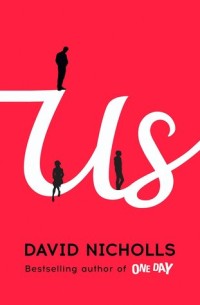Light travels differently in a room that contains another person
 Us
Us
by David Nicholls
I’ve enjoyed David Nicholls novels in the past, but the hype around this one, partly because it was longlisted for the Man Booker Prize, suggested it was something a bit different, a break from the usual. I was unsure how to feel about that, but I gave it a go and now I’m befuddled, because to me it felt exactly like a David Nicholls novel.
That’s not a criticism of the novel, only of the marketing. Well, maybe it’s a little bit a criticism of the novel, in that I’m not sure exactly why this was deemed more literary, more mature in style, because to me it’s not. It’s a sweet, easy-to-read tale that’s more about plot than the writing. It is often introspective and soul-searching and I very much enjoyed it. I just…thought I might get a little more from it.
The novel opens with middle-aged Douglas being woken by his wife Connie who says that she is leaving him. Or she thinks she wants to. Their marriage isn’t working for her anymore and in a few months’ time, when their son Albie leaves home for university, she will probably leave too. In the meantime, it’s the summer when they had intended to take Albie on the trip of a lifetime, an old-fashioned grand tour around Europe, or at least its greatest art galleries. Connie wants to go ahead and so Douglas throws himself into planning the best holiday ever, hoping that maybe this way he can salvage his marriage.
“At first I thought she was shaking me because of burglars. Since moving to the country my wife had developed a tendency to jerk awake at every creak and groan and rustle…I noted the time – a little after four – sighed, yawned and went downstairs. I stepped over our useless dog, padded from room to room, checked windows and doors then climbed the stairs once more.
‘Everything’s fine,’ I said. ‘Probably just air in the water pipes.’
‘What are you talking about?’ said Connie, sitting up now.
‘It’s fine. No sign of burglars.’
‘I didn’t say anything about burglars. I said I think our marriage has run its course. Douglas, I think I want to leave you.’ “
What comes to light during the holiday, which of course does not go perfectly, is that Douglas’s relationship with Albie is possibly even more broken than the one with his wife, and it is equally important that he try to fix that. It’s a romp, an adventure, but a believable one (for the most part), often painfully so. Enough curveballs were thrown that it didn’t feel too predictable and the characters were reasonably complex. It made me cry three times, the first time entirely out of the blue and to an extent that truly moved me.
But (obviously there was a but coming)…Douglas and Connie veer a little close to stereotypes for comfort. He’s slightly cold and distant, organised and efficient, uncomfortable discussing feelings or looking at modern art. And he’s a scientist. Connie is spontaneous, passionate, messy, emotional and selfish. And she’s an artist. It’s a disappointing set of clichés.
Douglas has spent 20 years learning about art to please Connie but shows no sign of his own hobbies or interests besides vague “science is great” moments. Connie has absolutely not absorbed any of his enthusiasm for science, or encouraged it in their son. Yet the book paints Douglas as the one who has failed, for putting his career before time with his family, for losing his temper when Albie wouldn’t do his homework, for not liking Connie’s friends as much as his own.
Partly this is because Douglas narrates the novel, and in trying to understand why everything is falling apart, he blames himself. And he is too much in love with and adulating of Connie to lay fault with her. The book is about his emotional journey, his self-examination and perhaps the equivalent story told from Connie’s perspective would reveal that she too blames herself and recognises her failures.
“Light travels differently in a room that contains another person; it reflects and refracts so that even when she was silent or sleeping I knew that she was there. I loved the evidence of her past presence, and the promise of her return, the way she changed the smell of that gloomy little flat. I had been unhappy there but that was in the past. It felt like being cured of some debilitating disease, and I was jubilant.”
Like Nicholls’ other novels this is very much a happy-sad book, with gentle humour and gentle sorrows. There is familiarity in Douglas’ realisation that life has not turned out the way he hoped or planned, and that it could have been different if he’d made it so. But there’s also a degree of denial that other people and circumstances are equally complicit.
Honestly, it is to Nicholls’ credit that I am ultimately so frustrated by both Douglas and Connie, because it shows that for all their tendency towards stereotype, they became real enough for me to believe in them and their capacity for growth and change. And while my tears towards the end of the book felt a little like they had been wrought by manipulation, like a Steven Spielberg film might, that point at the centre of the book that made me cry was a moment of true painful honesty and at that moment at least I was in love with the world of this book.
Published 2014 by Hodder & Stoughton.
Source: Won from the publisher in a competition on Twitter.